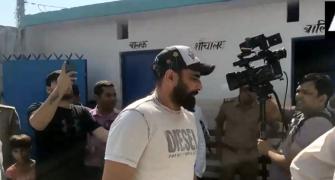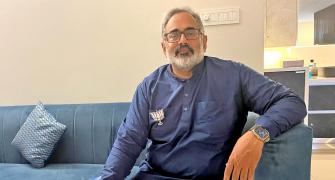 As the Phoenix Mars Lander safely landed on Mars on May 25, Dr Prasun Desai (seen in the picture) and his colleagues released the breath they had been holding in, in a long exhalation of relief.
As the Phoenix Mars Lander safely landed on Mars on May 25, Dr Prasun Desai (seen in the picture) and his colleagues released the breath they had been holding in, in a long exhalation of relief.
"After months of work and days of high anxiety, now I feel relaxed," Dr Desai, senior engineer and Entry, Descent and Landing lead engineer at Langley Research Center in Hampton, Virginia, said.
As one of the architects of the Lander, he knew anything could have happened during that final stage -- high winds could have adversely affected the descent, high landing speeds or too much tilt at landing would have entailed considerable damage to the craft.
Thus, the tension persisted until they received signals from the craft that the landing had gone off smoothly; they could now stand down for a space, as data from the Lander would only begin to come in later, Dr Desai, who grew up in Remington, New Jersey, said.
"The landing was not the most important thing. The design of the vehicle was much more complicated. Anyway, I feel great," he said.
One major challenge the team faced was Phoenix's 'soft' landing. Unlike the previous Mars missions Spirit and Opportunity, which used airbags for landing, Phoenix used propulsive engines to slow its descent and then land on three legs.
"It was a more sophisticated Lander than the landing systems that we've previously flown," Dr Desai said. The craft is now near the arctic region of Mars, with the task of looking for evidence of water. If there is ice, it means there is water, and also the possibility of life there, Desai said, adding that the Lander will shortly begin to dig for signs of water.
"By the fact that there is ice, it helps future missions significantly because you can live off the land," Desai said. "You can melt the ice and have water so that, whenever we send humans, they have something to drink. So you don't have to bring water with you."
According to Dr Desai, humans could also obtain oxygen on Mars from the water ice by conducting a typical high school chemistry experiment that involves an electrical current passing through water to separate it into hydrogen and oxygen.
"Knowing how much water there is on Mars helps us get an idea of what resources are there, so we can try to anticipate how we do future missions from that perspective," said Dr Desai.
The Lander was originally conceived as replacement for the cancelled Viking project in 1998. Langley's expertise in Mars Landers started decades ago, when it led the Viking project in the 1970s. Viking successfully landed two spacecraft on Mars in 1976. Researchers are still using data from those missions today.
"Many aspects of the design are still relying on the technology, the heritage of the Viking vehicle itself. The capsule shape is very similar," Dr Desai said. "Viking also did a soft landing on Mars back in the mid-70s."
In 2003, the project was revived. Many of the features of the old Lander were incorporated into the new version. NASA's Jet Propulsion Laboratory in Pasadena, and the Langley Research Center worked together with the University of Arizona and Lockheed Martin Space Systems on the systems.
Dr Desai says space exploration, including the Mars expedition, is useful in many ways. "We depend on satellites for faster communication. Once, we found nuclear stockpiles in the Soviet Union, which resulted in arms reduction treaties. We study the atmosphere in Venus to get more information about global warming," he noted. "So the exploration of space indirectly affects us and improves our quality of life in a big way."
He said the team is working on a Rover for the next expedition; unlike the stationary Lander, Rovers can travel around and will thus be able to glean more information from a wider area. Also in the works is a project to take man back to the moon.
Dr Desai's father Natwar Desai is a chemist, and wife Sonal is an attorney. He did his mechanical engineering degree from Rutgers University, and PhD in aeronautics from University of Illinois, before joining Langley in 1990.
It has been a hectic time, preparing the Lander for its mission; he would now like the pace of life to slow down a bit, he says. His experiences have taught him wisdom that he passes on to the community's young: "Make an effort as, with efforts, come opportunities. Some amazing things can happen in life. I am just a small example."








